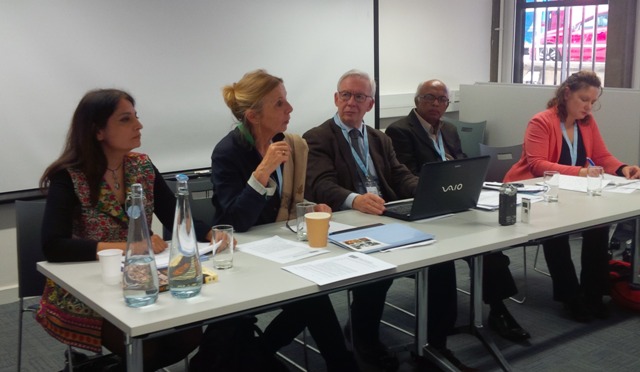 "It is high time the wider Commonwealth 'family' woke up to the threat to media freedom".
"It is high time the wider Commonwealth 'family' woke up to the threat to media freedom".
In a major speech two weeks ago, Commonwealth Secretary General Patricia Scotland called for a set of guidelines for the Commonwealth to take a more prominent role on freedom of media. The surprise is it has taken the Commonwealth so long to take such a public stand on this issue.
Back in 2003, a Commonwealth expert group published a booklet on best practice concerning Freedom of Expression, a valuable attempt to set out clear criteria and policy paths for governments to take a more active role on freedom of the media, the right to information, and the press’ ability to call governments to account.
Like other highly topical Commonwealth reports (such as its work on extremism), this then languished as the Commonwealth lagged behind other international organisations and stakeholders in moves to safeguard journalists, end government impunity especially related to abuses against journalists, and to work to remove colonial-era laws of sedition and defamation.
These have been used as convenient contemporary tools to persecute journalists and suppress unwelcome reporting, so hindering the ability of whole populations to access information on matters of serious public concern.
Democratic rights
This Commonwealth ‘absence’ on a core democratic rights issue is all the more striking, given the attention given by civil society to LGBT and other rights in recent years.
However, Secretary General Scotland’s warm endorsement of current civil society efforts to highlight the importance of media freedom and government accountability to robust press scrutiny was welcome.
But it was rather at odds with the picture of independent journalism already embattled and suffering under systemic threats which emerged from debates at the Institute of Commonwealth Studies’ major international conference on challenges to media freedom.
‘Responsible journalism’
Undoubtedly mindful of her need to answer to heads of government (who are always louder in their protests of the need for a free press when in opposition, and then may conveniently forget this when in office), Secretary General Scotland was cautious in her calls for ‘responsible reporting’.
But ‘responsible’ to whom, and for whom?
Governments have a propensity to interpret ‘responsible’ reporting in rather different ways to the reading public or the Fourth Estate itself.
What sort of signals are the UK’s government’s moves to introduce ‘Section 40’ in the face of fierce opposition from the media giving to other Commonwealth Governments?
Should governments ‘get out’ of media ownership completely? And should all state broadcasters convert to a public service model?
Does the proliferation of media platforms, television channels, electronic and mobile networks help or hinder reporting? Are bloggers and users of social media ‘journalists’?
To paraphrase Guy Berger (Director of Information, UNESCO), although governments may not like the hard scrutiny that comes with a robust and varied press, better that than the murky world of fake news and pedalled falsehoods which are particularly dangerous around election time.
Shaping the message
One thing is certain: as governments are always keen to ‘shape’ the political message, media freedom is hard won, needs constant vigilance and active defence. (Botswana’s increasingly repressive reporting environment is an object lesson in how a ‘poster child’ of democracy can regress alarmingly.)
Commonwealth civil society, led by members of the Commonwealth Journalists Association, is now working hard to set out core criteria to hold governments to account, so making past Commonwealth declarations into reality.
In the run up to the Commonwealth summit in London next April, the challenge will be how to catch the attention of busy heads, especially the UK government which is shaping the agenda.
As Prime Minister Theresa May has just catapulted this country into an election campaign, on top of likely fraught Brexit negotiations, it is going to be hard graft to add issues around media freedom and good governance to the agenda at a time when the host government seems determined to focus primarily on Commonwealth trade.
Trade is not the defining constituent in the modern Commonwealth: freedom of the press (as a core element of modern democracy) should be in this supposed values-based association.
Yet it is imperiled or under pressure in too many Commonwealth countries.
It is high time the wider Commonwealth ‘family’ woke up to this threat, and the Secretary General did something concrete about it.
Dr Sue Onslow is the Deputy Director of the Institute of Commonwealth Studies. She also sits on the Editorial Board of the Commonwealth Round Table.
Related articles
Summaries of the ICwS panel discussions are available here.
The Commonwealth Secretary General delivers the Peter Lyon Memorial lecture.



